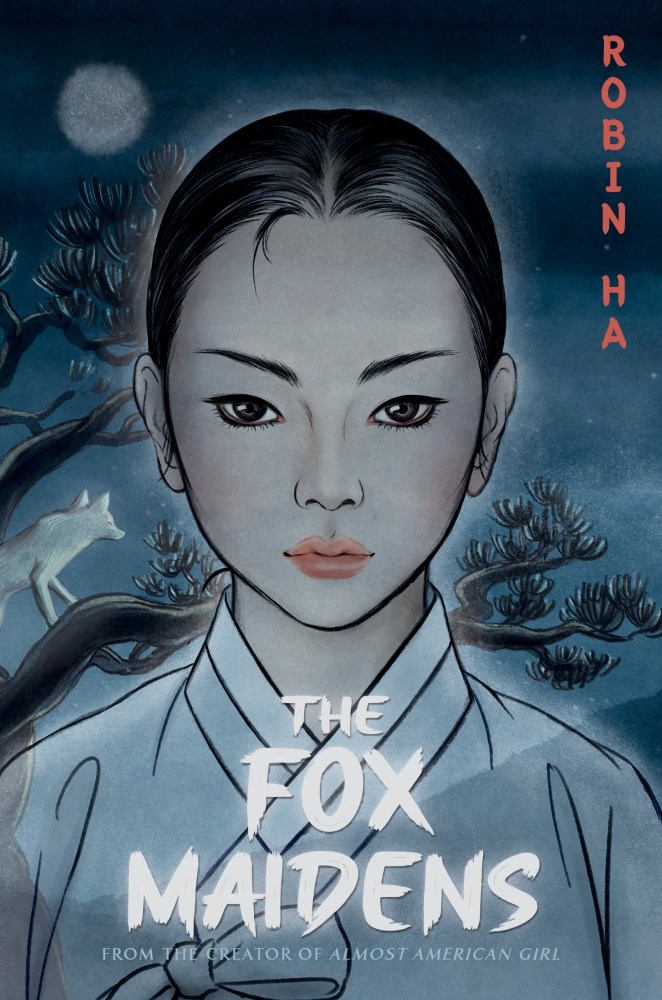Review: The Fox Maidens by Robin Ha
Category:
Rating:

Introduction:
Kai Song dreams of being a warrior. She wants to follow in the footsteps of her beloved father, the commander of the Royal Legion. But while her father believes in Kai and trains her in martial arts, their society isn’t ready for a girl warrior.
Still, Kai is determined. But she is plagued by rumors that she is the granddaughter of Gumiho, the infamous nine-tailed fox demon who was killed by her father years before.
Everything comes crashing down the day Kai learns the deadly secret about her mother’s past. Now she must come to terms with the truth about her identity and take her destiny into her own hands. As Kai desperately searches for a way to escape her fate, she comes to find compassion, and even love, in the most unexpected places.
Review:
Reviewed by Dakota Watson
This review contains minor spoilers.
As someone who’s devoured countless stories, I know graphic novels can be a tricky beast. Authors and illustrators face a unique challenge when conveying the full depth and weight of their narrative with limited space and relying solely on visuals and dialogue. So, with that in mind, I will review The Fox Maidens by Robin Ha solely based on what the pages held.
It fascinated me that The Fox Maidens explored 16th century South Korea, drawing from the powerful folklore of the Gumiho. While I feel that a longer format might have offered even more richness and context, I still found the story’s power in its unveiling of the struggles women faced in that era. The way the narrative highlighted their perceived inferiority – seen only as tools for marriage and childbearing – struck a chord with me.
Unlike many narratives set in such eras, I loved how Tamjin, Kai’s father was a man who saw his daughter not as a burden, but as someone with potential. He nurtured her strengths and championed her, even while grappling with his own deeply ingrained societal beliefs. This dynamic added a layer of complexity that I found captivating. Likewise, delving into the backstories of the Gumiho and Tamjin/Meorhu was a brilliant choice. Understanding their pasts shed light on motivations and ultimately fostered a deeper connection to their characters. It was as if the narrative wove a tapestry of interconnected lives, each thread enriching the overall picture.
The author did a commendable job portraying the unique challenges of an adolescent girl on the cusp of womanhood. Kai’s confusion and struggles with being “different” from the boys around her, paired with the cruel social stigma surrounding menstruation, felt incredibly raw and authentic. It was heartbreaking to see how easily her period could become ammunition for those intent on “putting her in her place.” Furthermore, the way the narrative depicted the societal pressure on young women to conform to a rigid ideal of “ladylike” behavior was insightful. It underscored the suffocating nature of such expectations, making Kai’s rebellious spirit all the more powerful.
I loved how The Fox Maidens explored the messy complexities of morality through Kai’s experiences. Her unwavering belief in self defined “rightness” was challenged, forcing her to confront the impact her actions could have on others’ lives. The moment she took down an abusive man, believing wholeheartedly she was saving a woman from a horrific existence, felt like a triumph. Yet, the author masterfully revealed the ripple effects of this action. The rescued woman grappled with the unexpected consequences: her status as a widow, the limited opportunities for her as a woman in such a society, and the harsh social stigma bearing down on her. This was a stark reminder that what seems inherently right from one viewpoint can have devastating unintended consequences for others. It left a lingering sense of unease in me, reminding me of the complex nature of moral choices.
While I thoroughly enjoyed The Fox Maidens, a specific narrative choice left me scratching my head. Kai’s mother’s decision to send her to a Kisaeng house as an apprentice felt incongruous with the established setting and social dynamics. Given her father’s position as a powerful General, it was difficult to reconcile this decision with the societal norms of the time. After all, in 16th century Korea, the Kisaeng profession was considered lowly, bordering on taboo. Sending one’s daughter down such a path would have been highly unlikely, especially for a family of such high standing. It’s important to note that this is just my personal opinion, and the author may have had a specific reason for this narrative choice that I simply didn’t pick up on during my reading experience.
While I adored the romance between Kai and Sira there was a definite sense of it being rushed. The limited time dedicated to the relationship’s development made it difficult for me to fully buy into Sira’s later motivation to sacrifice herself for Kai. Their love story felt more like a plot device to conveniently resolve Kai’s Gumiho curse than a deeply rooted connection. A deeper dive into Sira’s backstory could have made her character even more compelling. Understanding her own struggles and experiences would have allowed me to invest in her more fully as an individual, strengthening my belief in her connection with Kai and her ultimate sacrifice.
Despite a few minor hiccups, The Fox Maidens was a powerful and enjoyable read. Its exploration of a young woman’s journey of self discovery, wrestling with her identity and sexuality in a rigid and restrictive society, was both moving and thought provoking. The graphic novel painted a raw and honest picture of the challenges women faced while highlighting a protagonist determined to forge her own path. If you enjoy coming-of-age stories with a dash of historical context and compelling characters, you’ll likely find yourself engrossed in this one.
Book Cover:


